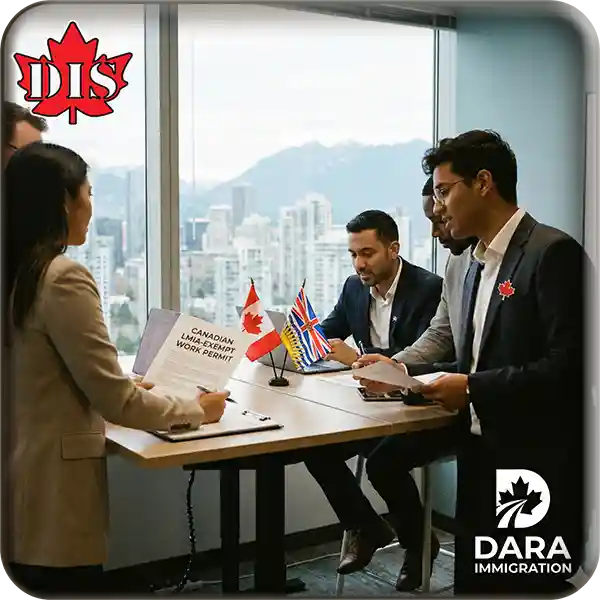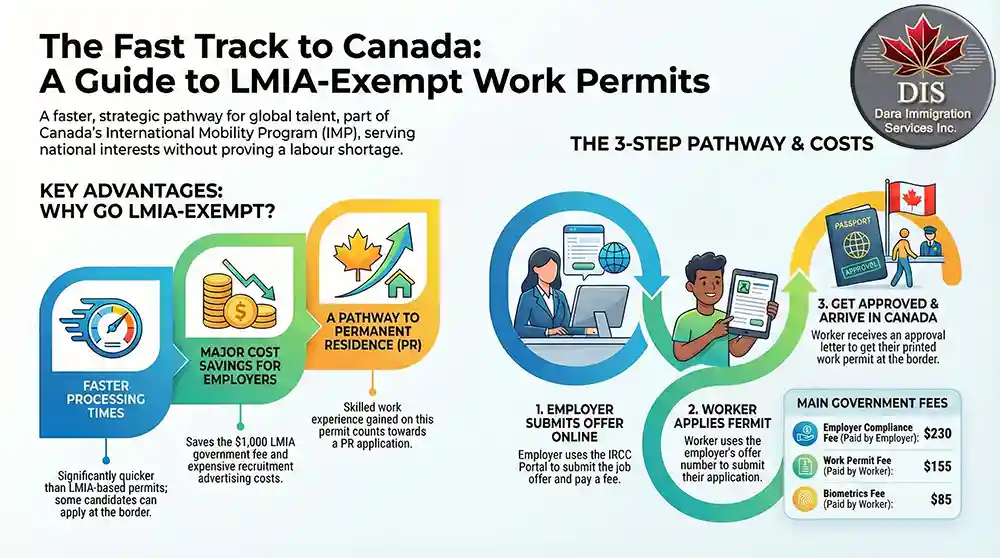Canadian LMIA Exempt Work Permit
Canadian LMIA Exempt Work Permit Overview 2026-2027
Securing a Canadian LMIA Exempt Work Permit is often the fastest and most strategic pathway for global talent to enter the Canadian workforce. For employers, it eliminates the lengthy and expensive requirement of advertising the job to Canadians (the LMIA process). For workers, it often means faster processing and a smoother transition to Permanent Residence.

However, “Exempt” does not mean “Automatic.” You cannot simply show up at the border and claim an exemption. You must prove your eligibility under specific codes of the International Mobility Program (IMP). A selection of the wrong exemption code (e.g., claiming C12 instead of C11) is the most common reason for refusal.
At Dara Immigration Services, we specialize in identifying the correct exemption codes for your unique situation. Whether you are transferring an executive from New York or hiring a French-speaking professional for Toronto, this guide is your roadmap to bypassing the LMIA red tape.
Key Takeaways (Quick Summary):
- No Advertising: Employers do not need to post the job on job boards or prove a labour shortage.
- The “IMP” Advantage: These permits serve Canada’s broader economic and cultural interests (e.g., CUSMA, Francophone Mobility).
- Speed: Processing is significantly faster than LMIA-based permits; eligible candidates can sometimes apply directly at the Port of Entry (border).
- Employer Compliance: The employer must still submit an offer via the IRCC Employer Portal and pay a $230 fee.
What is the International Mobility Program (IMP)?
While the Temporary Foreign Worker Program (TFWP) is about filling labour shortages (requiring an LMIA), the International Mobility Program (IMP) is about advancing Canada’s economic and cultural interests.
Why Choose a Canadian LMIA Exempt Work Permit Stream?
If you qualify, this is always the preferred route over an LMIA.
- Cost Effective: Saves the employer the $1,000 LMIA government fee and recruitment costs.
- PR Pathway: Experience gained on these permits (TEER 0, 1, 2, 3) counts toward the Canadian Experience Class (CEC).
- Spousal Support: High-skilled workers on these permits can usually bring their spouses on Open Work Permits.
Top Canadian LMIA Exempt Work Permit Categories (2026)
- Francophone Mobility (C16): For French-speaking workers outside Quebec (requires NCLC Level 5).
- Intra-Company Transferees (C12): Transferring executives or specialized knowledge staff from a foreign branch to a Canadian branch.
- International Trade Agreements (T23/T24): CUSMA (formerly NAFTA), CETA (Europe), and CPTPP professionals.
- Significant Benefit (C11): Entrepreneurs and self-employed individuals whose work will generate significant economic/social benefits.
- Bridging Open Work Permit (A75): For those waiting for a decision on their PR application.
Canadian LMIA Exempt Work Permit Eligibility Requirements
To apply, you must meet the specific criteria of the exemption code you are claiming.
1. The Offer of Employment Number (“A” Number)
Unlike an Open Work Permit, most Canadian LMIA Exempt Work Permit are employer-specific.
- Requirement: The employer must log in to the IRCC Employer Portal, submit the job offer, and pay the $230 Employer Compliance Fee.
- Result: IRCC generates an “A-Number” (e.g., A1234567) which the worker needs to apply for the visa.
2. Proof of Qualification
You must prove you meet the exemption criteria.
- ICT (C12): Proof of 1 year of employment with the foreign company in the last 3 years.
- CUSMA (NAFTA): Relevant degree and professional license (e.g., Engineer, Accountant).
- Francophone (C16): Language test results (TEF/TCF) showing NCLC 5 or higher.
3. General Admissibility
- Medical: Valid IME (if working in healthcare or child care).
- History: No criminal record or past immigration violations.
Costs, Fees & Timelines (2026 Estimates)
Note: The “Service Fee” listed below refers to government processing fees, not legal retainer fees.
| Category | Government Fee (CAD) | Paid By | Notes |
| Employer Compliance Fee | $230 CAD | Employer | Mandatory for all employer-specific exempt permits. |
| Work Permit Fee | $155 CAD | Worker | The standard processing fee. |
| Biometrics Fee | $85 CAD | Worker | Valid for 10 years. |
| Open Work Permit Holder Fee | $100 CAD | Worker | Added only if applying for an Open Permit (e.g., BOWP). |
| Processing Time (Online) | 4 – 12 Weeks | N/A | Varies by country. |
| Processing Time (Flagpoling) | Immediate | N/A | Only for eligible visa-exempt/US applicants at the border. |
Canadian LMIA Exempt Work Permit Step-by-Step Application Process
Step 1: Identify the Exemption Code
This is the legal foundation of your application.
- Action: Consult with an RCIC to confirm if you are C11, C12, C16, or T23. Using the wrong code leads to refusal.
Step 2: Employer Submission (The Portal)
The employer creates an account on the IRCC Employer Portal.
- Input: Job details, wage, and exemption rationale.
- Payment: Pay the $230 compliance fee.
- Output: Receive the Offer of Employment Number (A#).
Step 3: Gather Worker Documents
- Proof of Competence: Resume, diplomas, and reference letters.
- Job Offer Letter: Matching the details in the Portal.
- Passport: Valid for the duration of the intended stay.
Step 4: Submit Work Permit Application
- Online: Create a GCKey profile and upload documents.
- Port of Entry (Border): If you are a US Citizen or from a visa-exempt country, you may be able to apply upon arrival (Flagpoling). Note: Check current border processing hours before attempting this.
Step 5: Biometrics and Approval
Once approved, you receive a Port of Entry (POE) Letter of Introduction. Present this to the border officer to get your printed work permit.
Canadian LMIA Exempt Work Permit Risks and Refusals
Without an LMIA to “pre-validate” the job, the officer at the border makes the final call. Scrutiny is high.
1. The “Specialized Knowledge” Trap (ICT)
For Intra-Company Transferees, it is not enough to be “skilled.” You must have proprietary knowledge unique to the company.
- Refusal Reason: “Applicant possesses general industry knowledge, not proprietary knowledge.”
2. “Significant Benefit” Vague Plans (C11)
Entrepreneurs often fail because they cannot prove their business will hire Canadians or generate revenue.
- Fix: A robust Business Plan is mandatory.
3. Misalignment with the Portal
If the job duties listed in the Employer Portal differ from the duties in your Reference Letters, the officer will refuse the application for inconsistency.
Frequently Asked Questions (FAQ)
- Can I apply for a Canadian LMIA exempt work permit at the border?
Yes, but only if you are visa-exempt (e.g., UK, Australia) or a US Citizen. Visa-required nationals (e.g., India, China) must apply online and wait for approval before traveling, even if they are LMIA-exempt.
- Does this work permit lead to Permanent Residence?
Indirectly, yes. Working in Canada on this permit (in a skilled role) gains you points for “Canadian Work Experience” under Express Entry (CEC), which is a powerful driver for PR.
- Do I need an IELTS test for this work permit?
Usually, no. Proof of language is required for PR, but not strictly for the work permit (unless applying under the Francophone Mobility stream, where French test results are mandatory).
- Can my employer ask me to pay the $230 compliance fee?
No. IRCC regulation states that the Employer Compliance Fee must be paid by the employer. It is a regulatory cost of doing business, not a worker expense.
- What is the difference between CUSMA and regular IMP?
CUSMA (formerly NAFTA) is a specific agreement for citizens of the USA and Mexico. It has its own list of 60+ professionals. Regular IMP streams (like C12) are open to all nationalities.

Professional Immigration Assistance
The Canadian LMIA Exempt Work Permit is a privilege, not a right. One wrong box checked on the Employer Portal can trigger a compliance audit for your company or a refusal for your star employee.
Don’t navigate the complex IMP codes alone. Contact Dara Immigration Services today. We ensure your exemption strategy is sound, compliant, and “decision-ready.”
Disclaimer: This article provides general information regarding the International Mobility Program and does not constitute legal advice. Policies change frequently.
Download:
Download the bulletin of Canadian LMIA Exempt Work Permit as a PDF.
Download “Canadian-LMIA-Exempt-Work-Permit-Bulletin-2026-2027.pdf” Canadian-LMIA-Exempt-Work-Permit-Bulletin-2026-2027.pdf – Downloaded 35 times – 1.73 MB